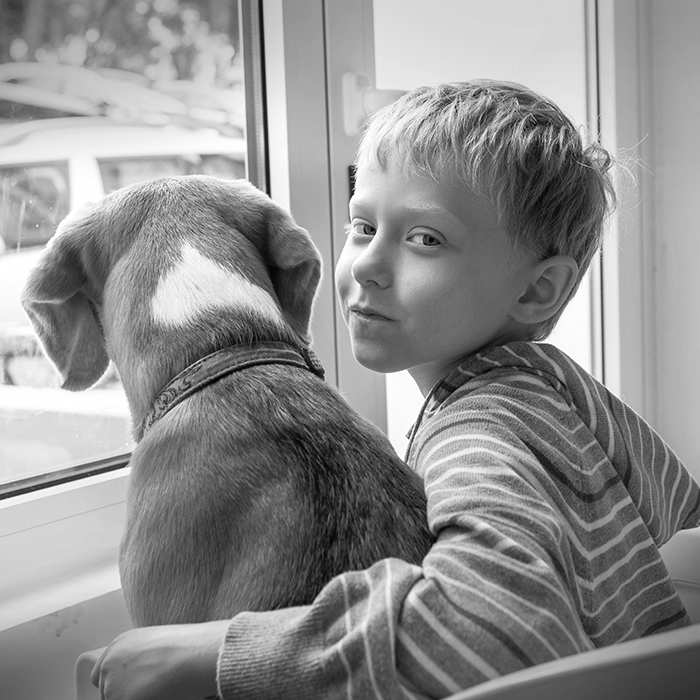Dealing with the Death of a Beloved Pet

Our pets occupy a very special place in our hearts. Not only do they give us joy, keep us company when it’s needed the most and cause us to pull our hair out (at times), from the moment they enter our lives, they are welcome, loved and irreplaceable as a part of the family.
But, with life comes death, and it’s the same for everyone including our pets. How is it that we grieve just as much for an animal as another human being?
Our pets love us for who we are – they accept us for all our flaws or shortcomings, warts and all. We grow up with our pets. Our dog or cat may have shared some pretty significant milestones with us or have just been there to share the tough times. Pets become best friends that never ask why or what if, they don’t rely on promises or common interest to remain loving and loyal. Whether you’re a child or an adult, in a marriage, a long-term partnership, have kids or not, our pets embody some of the best companionship we could ever hope to have.
It’s tough when a pet dies. Nobody will dispute it – it’s one of the worst feelings in the world when your best friend gets old and sick, has an unforseen accident, or simply disappears. Grieving for a pet can be just as difficult as grieving for anyone else in the family and it’s important to give yourself the time and space to work through these feelings properly.
We’ve put together a few tried and tested ways to deal with the loss of a pet – how to explain it to the kids, how to recognise grief, work through it and move on without that special bow wow or meow.
Recognise your grieving period.
Grief isn’t just about feeling sad – there are a number of feelings you’ll likely encounter. It’s important to understand that the emotions you’re feeling are a part of the grieving process. This recognition will help you to reflect on your feelings, take note of why you’re feeling the way you are and, in time, it will help you to move to a place of acceptance and peace.
Everybody experiences grief in different ways. This list simply outlines some common phases you, your partner or child may experience during this time.
- Denial: Think of this phase as a defence mechanism, designed to protect you from having to confront the painful reality of loss.
- Anger: This is a common feeling associated with grief and is often in reaction to feelings of confusion, guilt, fear and loneliness.
- Bargaining: This phase usually occurs when you discover your pet is going to die. It’s common for owners to insist vets proscribe higher doses of medication or perform unnecessary or dangerous surgeries in a last-ditch attempt.
- Depression: Grief and depression are different conditions, yet they can share similar symptoms. Extreme sadness is a natural part of grief but, if it lasts for a long period of time and you become isolated or withdrawn, depression may be a factor and it’s best to seek support.
- Acceptance: The final phase of the grieving process and one of peace and calm. Acceptance occurs when an understanding of your pet’s death is reached.
Replacement pets aren’t a great idea, not yet anyway.
A new pet is a great idea for once the grieving period is over. The introduction of a new family member into the home will require a lot of dedication from you and the rest of the family.
During the grieving process it’s far too much to ask that of yourself, especially when such an emotional time is cause for distraction. Building a good, lasting relationship with a new animal will need all your focus – don’t attempt to cross that bridge too soon.
That said, the length of time required to grieve properly varies for each individual. Welcoming a new pet into the family is a great step but one that should be taken when you feel you are truly ready.
How to tell the kids their friend is gone.
Telling children that their best friend has died or is going to die is never easy. It is something, however, that must be addressed, especially for their own grieving process to begin.
Underestimating your child is the worst thing you can do. Children are very perceptive and capable of computing even some of the most difficult or emotionally abstract concepts. The number one rule when talking to your child about death is to be honest – trust is perhaps the most important thing here and you’ve got to begin by giving them the news straight.
Be careful how you explain things to children, language can be tricky at times. Here are a few common mistakes to look out for:
- Never use the term ‘put to sleep’ when talking about euthanizing a pet. It’s okay to use the term around adults, but young kids may not understand the difference between sleeping and death.
- Avoid terms like ‘went away’ or ‘gone to a better place’. Kids may think that their pet has been sent away for being misbehaved or left because they didn’t want to stay with the family.
- Don’t tell your child that they are overreacting to the loss of a pet. Tears are natural and they should be allowed to express their feelings of sadness and disappointment. Never say ‘be strong’ or ‘don’t be silly’ during the child’s grieving process.
Remember that truth is your greatest ally during this difficult time. Supporting your child while they grieve can even you to work through your own sadness.
Our other pets may be grieving too.
The animals in our lives are sensitive to any change in the household, especially when their human family members are experiencing strong emotions. While your other pets may not necessarily be grieving for the pet who has died, they’ll feel your pain.
Try to give them more time than usual – take them for extra walks or play a game, pat them during the times you’re feeling down. This will do wonders to reassure your other pets that everything will continue as normal and will likely go a long way towards helping you deal better with the loss as well.
There are others you can talk to – don’t do it on your own.
Losing a pet is never easy and if you’re unable to share your feelings with anyone or you’re doing it tougher than you expected, it’s a good idea to seek some help.
Talking is one of the most proven ways to reflect upon and work through your feelings in life. If you live alone or someone in your family is finding the process of grief a challenge, consider getting in touch with an expert. Psychologists and grief councillors can help you work through this difficult time.
Other options for help include:
Lifeline (Phone 13 11 14), GriefLine (12pm-3am Phone 03 9935 7400), Kids Helpline (Phone 1800 551 800), Beyond Blue (Phone 1300 224 638) or MensLine (Phone 1300 789 978).



